Highlights of the third day of the eighth "Advanced Seminar on Clinical Practice Skills of Geriatrics" and the National Health and Health Commission's "Prevention and Intervention of Disability after Senile Weakness" training
On November 9, 2021, jointly sponsored by the Chinese Geriatric Society and the National Clinical Medical Research Center for Geriatric Diseases (PLA General Hospital), The 8th Advanced Training Course on Geriatric Clinical Practice Skills jointly organized by the International Exchange Working Committee of the Chinese Geriatric Society and the Second Medical Center of the PLA General Hospital and the National Health Commission's "Prevention and Intervention of Senile Disability" and "Prevention and Intervention of Senile Disability after Senile Debilitation" (2019GJWJW7) project training course, Professor Luo Leiming from the Second Medical Center of the PLA General Hospital started the last day of wonderful classes.
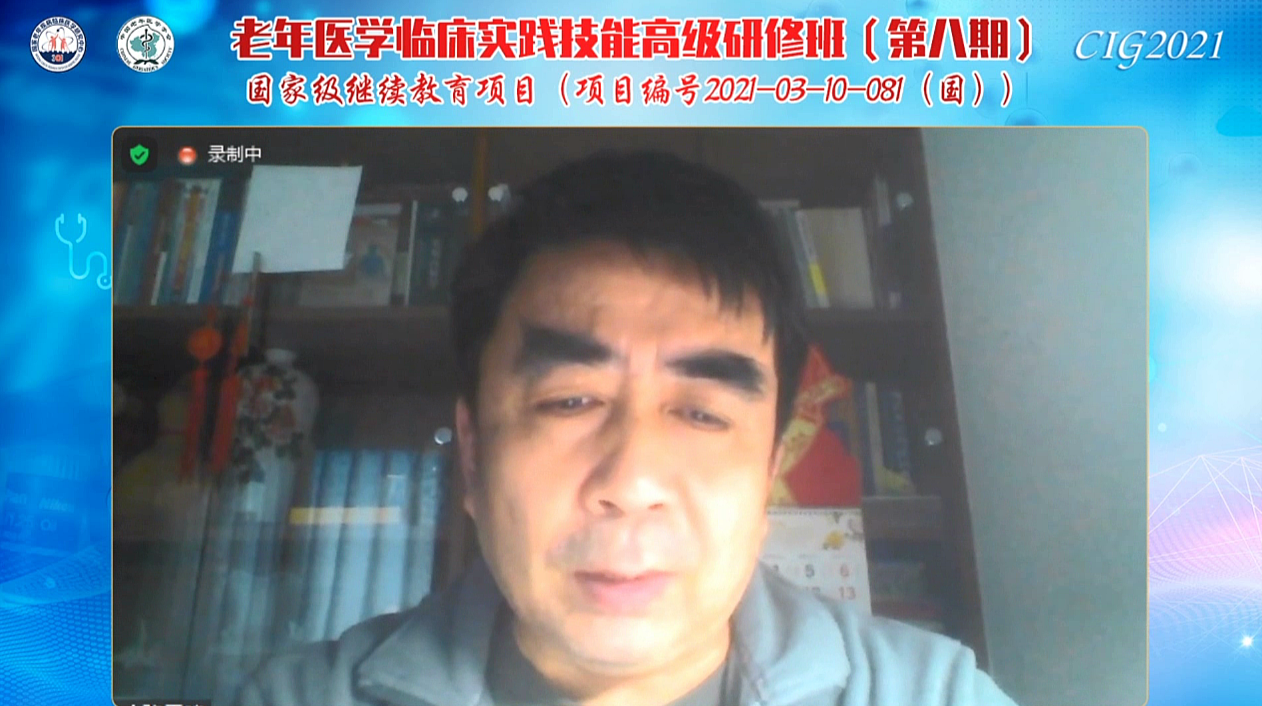 The first half of the morning session was chaired by Professor Lo Leiming and Professor Chow Fei-fu.
The first half of the morning session was chaired by Professor Lo Leiming and Professor Chow Fei-fu.
Professor Zhou Feihu from the Department of Critical Care Medicine of the First Medical Center of the PLA General Hospital shared the relevant knowledge of early rehabilitation treatment for elderly patients with severe diseases from the perspective of ICU. Professor Zhou mentioned in the lecture that people about 65 years old account for nearly 65% of ICU patients, so the elderly account for a large proportion of severe cases. Early activity in elderly patients with severe diseases is conducive to recovery, and it is necessary to evaluate whether there are indications for early activity, and formulate feasible plans for early activity, which should be gradual, such as from bed activity and exercise to sitting up, sitting side, getting out of bed, getting out of bed activities, etc., and pay attention to ensuring patient safety and dynamic assessment effect.
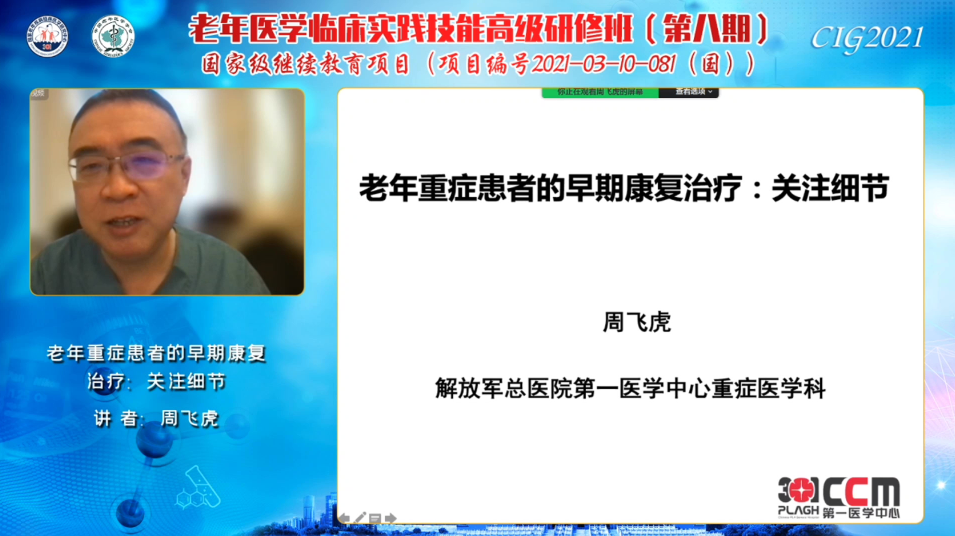 Professor Feng Xue from Fuwei Hospital of Chinese Academy of Medical Sciences introduced the relevant knowledge of the progress of cardiac rehabilitation to the prevention of elderly disability from five aspects: cardiac rehabilitation, the status quo of elderly disability, the assessment of elderly ability, the intervention strategy for preventing elderly disability, CPET and the formulation of exercise prescription.
Professor Feng Xue from Fuwei Hospital of Chinese Academy of Medical Sciences introduced the relevant knowledge of the progress of cardiac rehabilitation to the prevention of elderly disability from five aspects: cardiac rehabilitation, the status quo of elderly disability, the assessment of elderly ability, the intervention strategy for preventing elderly disability, CPET and the formulation of exercise prescription.
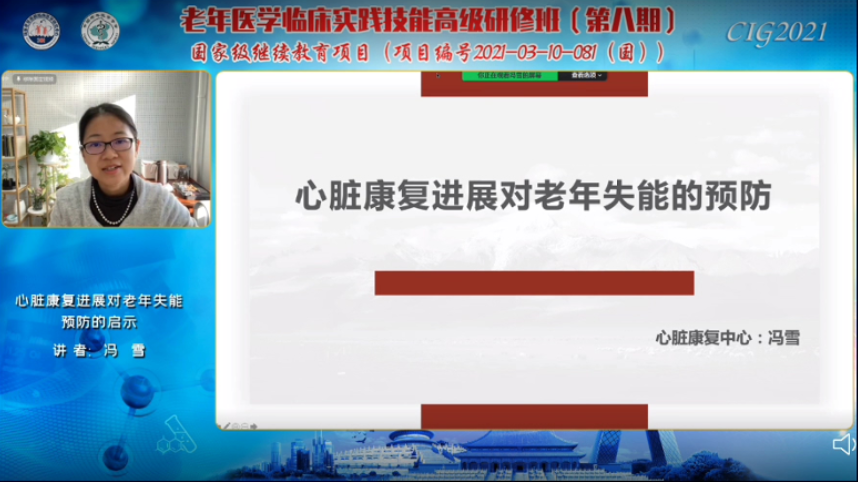 Professor Tian Hui, honorary president of Endocrinology and Metabolism Branch of Chinese Geriatric Society and Endocrinology Department of the Second Medical Center of PLA General Hospital, took diabetes, which is well known to the public, as a starting point to share relevant knowledge on the management of elderly diabetes combined with fthenia. Professor Tian brilliantly summarized the relationship between diabetes and frailty, how to manage goals and treatment strategies. Professor Tian mentioned that diabetes combined with fthenia will increase the risk of poor prognosis, comprehensive evaluation of patients is the basis for reasonable and effective treatment, and fthenia patients are in great need of psychological counseling, good nursing and family and social support.
Professor Tian Hui, honorary president of Endocrinology and Metabolism Branch of Chinese Geriatric Society and Endocrinology Department of the Second Medical Center of PLA General Hospital, took diabetes, which is well known to the public, as a starting point to share relevant knowledge on the management of elderly diabetes combined with fthenia. Professor Tian brilliantly summarized the relationship between diabetes and frailty, how to manage goals and treatment strategies. Professor Tian mentioned that diabetes combined with fthenia will increase the risk of poor prognosis, comprehensive evaluation of patients is the basis for reasonable and effective treatment, and fthenia patients are in great need of psychological counseling, good nursing and family and social support.
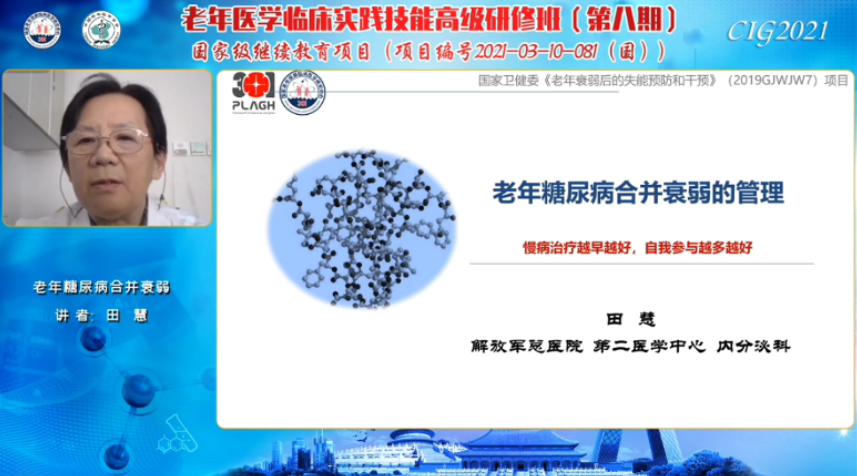 Professor Xu Guogang, from the Second Medical Center of the PLA General Hospital, expressed his views on the comorbidity of chronic diseases in the elderly and the novel coronavirus pneumonia. Professor Xu first reviewed the management of chronic diseases in the elderly and the implications of his years of work experience on the novel coronavirus pneumonia, and then introduced the epidemiological history of the elderly novel coronavirus pneumonia, clinical treatment and precautions in isolation and control.
Professor Xu Guogang, from the Second Medical Center of the PLA General Hospital, expressed his views on the comorbidity of chronic diseases in the elderly and the novel coronavirus pneumonia. Professor Xu first reviewed the management of chronic diseases in the elderly and the implications of his years of work experience on the novel coronavirus pneumonia, and then introduced the epidemiological history of the elderly novel coronavirus pneumonia, clinical treatment and precautions in isolation and control.
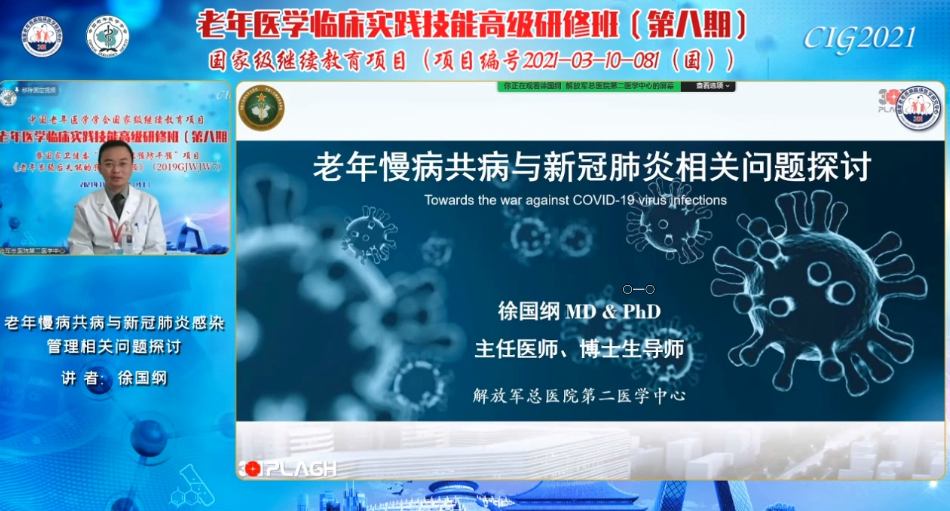 The second half of the morning session was chaired by Professor Hua Qi, President of Hypertension Branch of Chinese Geriatric Society, Xuanwu Hospital of Capital Medical University, and Professor Wei Bo, First Medical Center of PLA General Hospital.
The second half of the morning session was chaired by Professor Hua Qi, President of Hypertension Branch of Chinese Geriatric Society, Xuanwu Hospital of Capital Medical University, and Professor Wei Bo, First Medical Center of PLA General Hospital.
Professor Ma Qiang of the Department of Nephrology of the Second Medical Center of the PLA General Hospital, with the title "Prevention of Kidney disease and frailty disability in the elderly", shared the concept of chronic kidney disease and kidney function evaluation methods, relevant formulas and applicable populations, the impact of chronic kidney disease on frailty, as well as the mechanism of frailty occurrence and intervention methods in patients with chronic kidney disease.
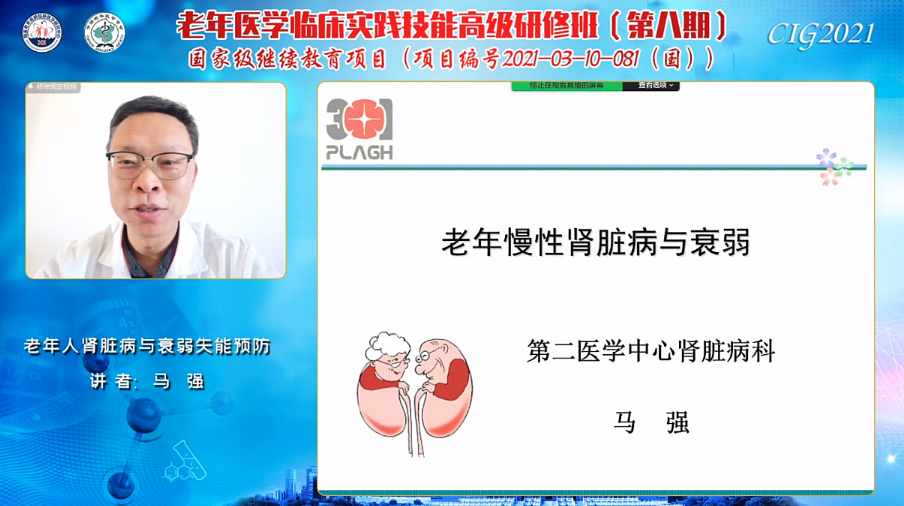 Professor Hua Qi from Xuanwu Hospital of Capital Medical University and Professor Zhang Yuqing from Fuwai Hospital of Chinese Academy of Medical Sciences both shared their relevant knowledge and valuable experience with the elderly hypertension. Hua Qi interpreted the "Guidelines for the Management of Hypertension in the Elderly in China" for everyone, from the four aspects of the guidelines overview, diagnosis and evaluation, treatment, community support and remote management, the background of the development of the guidelines, the prevalence of hypertension in the elderly, characteristics, risk stratification, drug and non-drug treatment, community support and other relevant key contents were wonderfully explained.
Professor Hua Qi from Xuanwu Hospital of Capital Medical University and Professor Zhang Yuqing from Fuwai Hospital of Chinese Academy of Medical Sciences both shared their relevant knowledge and valuable experience with the elderly hypertension. Hua Qi interpreted the "Guidelines for the Management of Hypertension in the Elderly in China" for everyone, from the four aspects of the guidelines overview, diagnosis and evaluation, treatment, community support and remote management, the background of the development of the guidelines, the prevalence of hypertension in the elderly, characteristics, risk stratification, drug and non-drug treatment, community support and other relevant key contents were wonderfully explained.
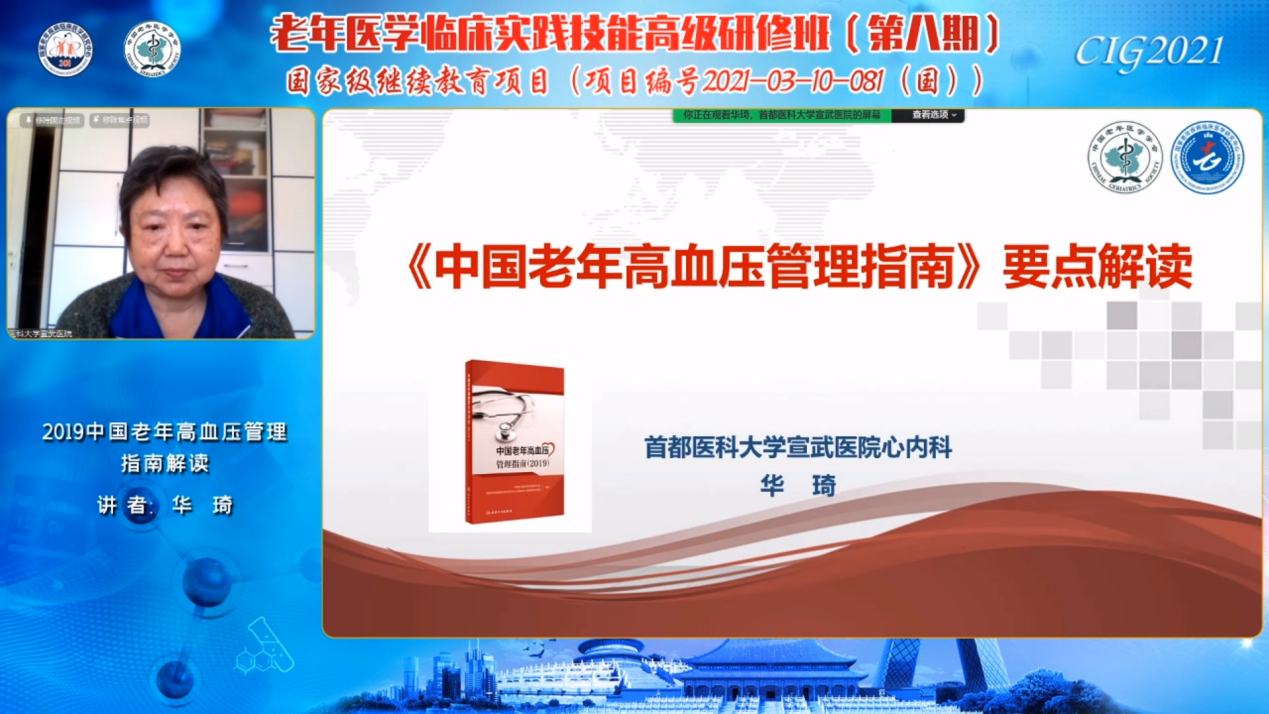 Professor Yuqing Zhang from Fuwai Hospital of Chinese Academy of Medical Sciences told us about the heterogeneity of hypertension management in the elderly. The treatment of elderly hypertension not only involves the pathophysiological characteristics of elderly patients, but also involves many social and economic factors in contemporary society. Factors such as the level of medical security in different regions and the level of education of patients have a significant correlation with the standard of elderly hypertension blood pressure. In addition, published studies on blood pressure targets for elderly patients with hypertension further support the recommendations of the 2018 Chinese Guidelines for Hypertension Prevention and Treatment and the 2019 Chinese Guidelines for Elderly Hypertension Management that blood pressure targets for elderly patients should be determined according to the degree of patient tolerance.
Professor Yuqing Zhang from Fuwai Hospital of Chinese Academy of Medical Sciences told us about the heterogeneity of hypertension management in the elderly. The treatment of elderly hypertension not only involves the pathophysiological characteristics of elderly patients, but also involves many social and economic factors in contemporary society. Factors such as the level of medical security in different regions and the level of education of patients have a significant correlation with the standard of elderly hypertension blood pressure. In addition, published studies on blood pressure targets for elderly patients with hypertension further support the recommendations of the 2018 Chinese Guidelines for Hypertension Prevention and Treatment and the 2019 Chinese Guidelines for Elderly Hypertension Management that blood pressure targets for elderly patients should be determined according to the degree of patient tolerance.
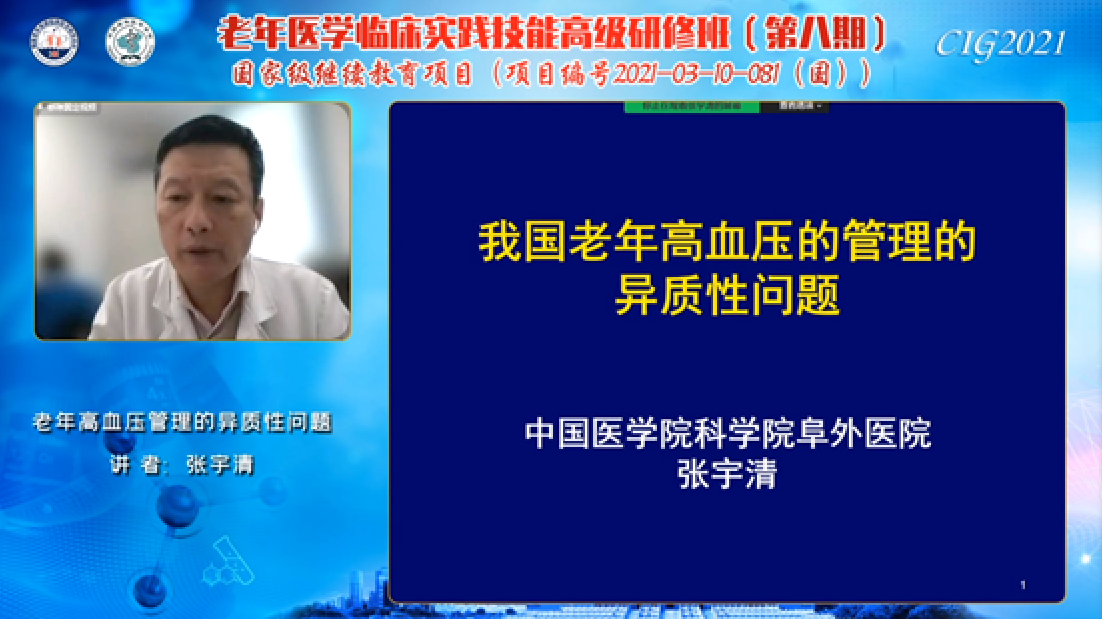
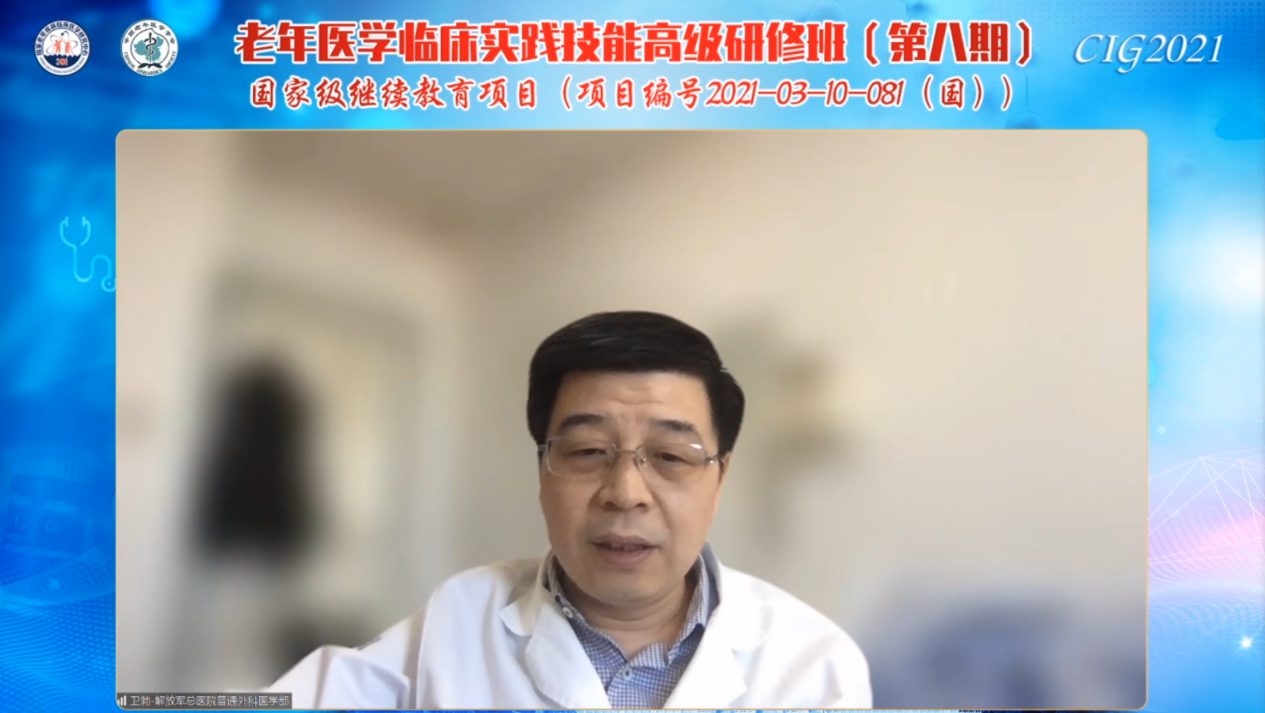 Professor Wei Bo of the First Medical Center of the PLA General Hospital moderated the comments
Professor Wei Bo of the First Medical Center of the PLA General Hospital moderated the comments
Professor He Yao, Director of the Expert Committee of the Chinese Geriatric Society and the Second Medical Center of the PLA General Hospital, chaired and commented
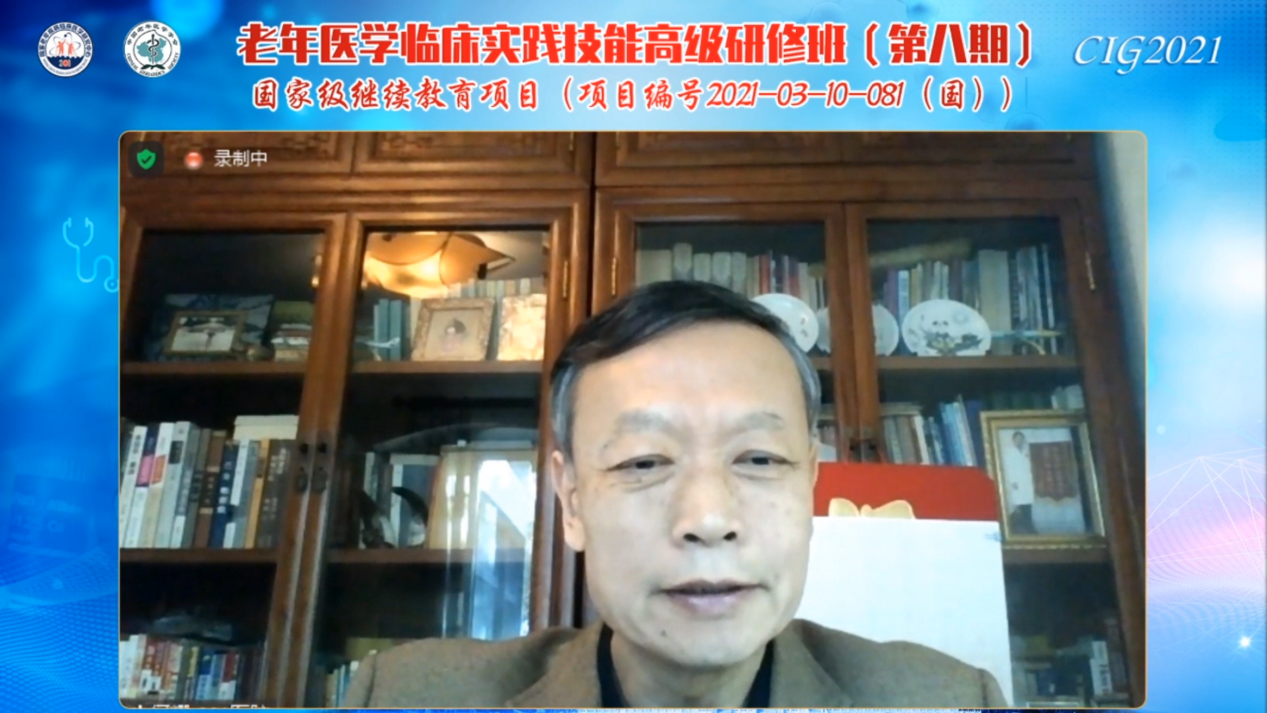 The afternoon meeting was chaired by Professor Cao Feng, vice president of the Chinese Geriatric Society and executive deputy director of the National Geriatric Disease Clinical Medical Research Center (PLA General Hospital), and Professor He Yao, director of the Expert Committee of the Chinese Geriatric Society and the second Medical Center of the PLA General Hospital.
The afternoon meeting was chaired by Professor Cao Feng, vice president of the Chinese Geriatric Society and executive deputy director of the National Geriatric Disease Clinical Medical Research Center (PLA General Hospital), and Professor He Yao, director of the Expert Committee of the Chinese Geriatric Society and the second Medical Center of the PLA General Hospital.
Professor Sun Feng from Peking University School of Public Health will introduce the application of model-based mesh meta-analysis in drug evaluation. Professor Sun gave a very systematic explanation from the concept and origin of mesh Meta to specific methods, the use of software and its role in drug evaluation.
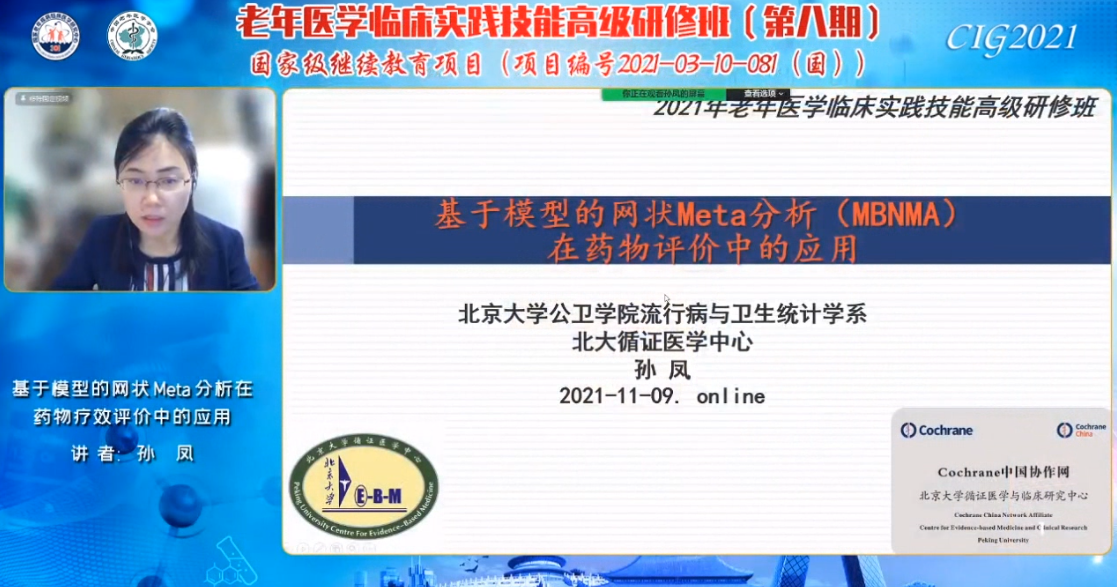 Professor Cao Feng, vice president of the Chinese Geriatric Society and executive deputy director of the National Clinical Medical Research Center for Geriatric Diseases (PLA General Hospital), took writing papers as a starting point to explain how to make articles attractive when writing. Professor Cao Feng explained the key factors that determine the quality of clinical research papers, the basic requirements of paper writing, the recommended software, and shared his valuable experience. It is a great benefit for all students.
Professor Cao Feng, vice president of the Chinese Geriatric Society and executive deputy director of the National Clinical Medical Research Center for Geriatric Diseases (PLA General Hospital), took writing papers as a starting point to explain how to make articles attractive when writing. Professor Cao Feng explained the key factors that determine the quality of clinical research papers, the basic requirements of paper writing, the recommended software, and shared his valuable experience. It is a great benefit for all students.
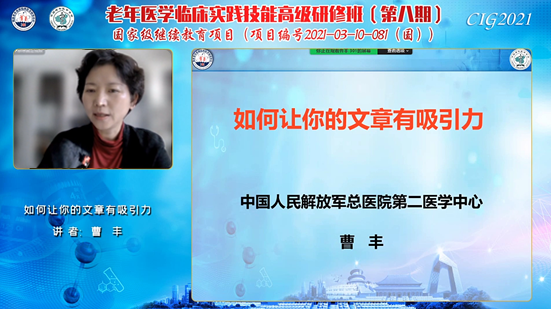 Associate Professor Liu Miao, Director General of Epidemiology and Disease Prevention Branch of Chinese Geriatrics Society and Graduate School of PLA General Hospital, brought to you the relevant knowledge of "Analytical strategies for therapeutic research". She cited several cases from the real world and RCT to evaluate the design of therapeutic research, which provided many methods for you to work in the future.
Associate Professor Liu Miao, Director General of Epidemiology and Disease Prevention Branch of Chinese Geriatrics Society and Graduate School of PLA General Hospital, brought to you the relevant knowledge of "Analytical strategies for therapeutic research". She cited several cases from the real world and RCT to evaluate the design of therapeutic research, which provided many methods for you to work in the future.
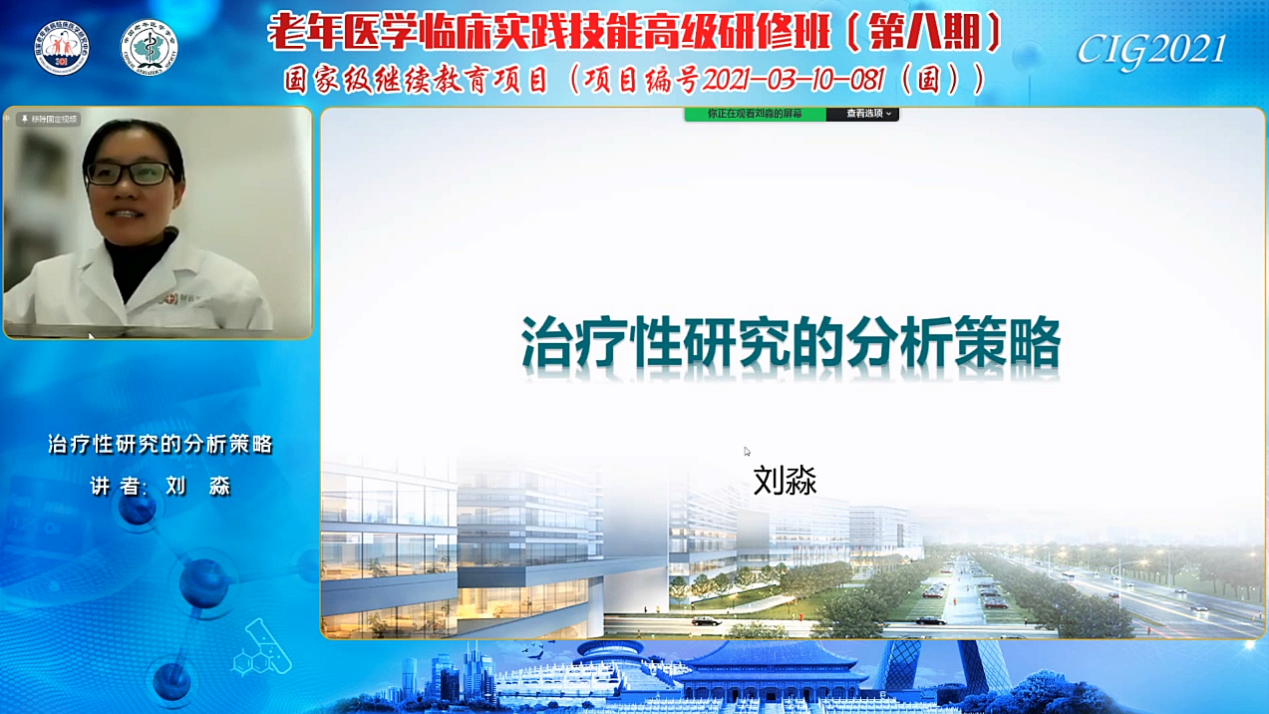 Professor Weng Changshui, vice president of the Rehabilitation Branch of the Chinese Geriatric Society and the Second Medical Center of the PLA General Hospital, gave a wonderful explanation on the topic of "Ultra-slow resistance Training Practice". Director Weng made a complete and detailed introduction from the theoretical basis, practical process and effect.
Professor Weng Changshui, vice president of the Rehabilitation Branch of the Chinese Geriatric Society and the Second Medical Center of the PLA General Hospital, gave a wonderful explanation on the topic of "Ultra-slow resistance Training Practice". Director Weng made a complete and detailed introduction from the theoretical basis, practical process and effect.
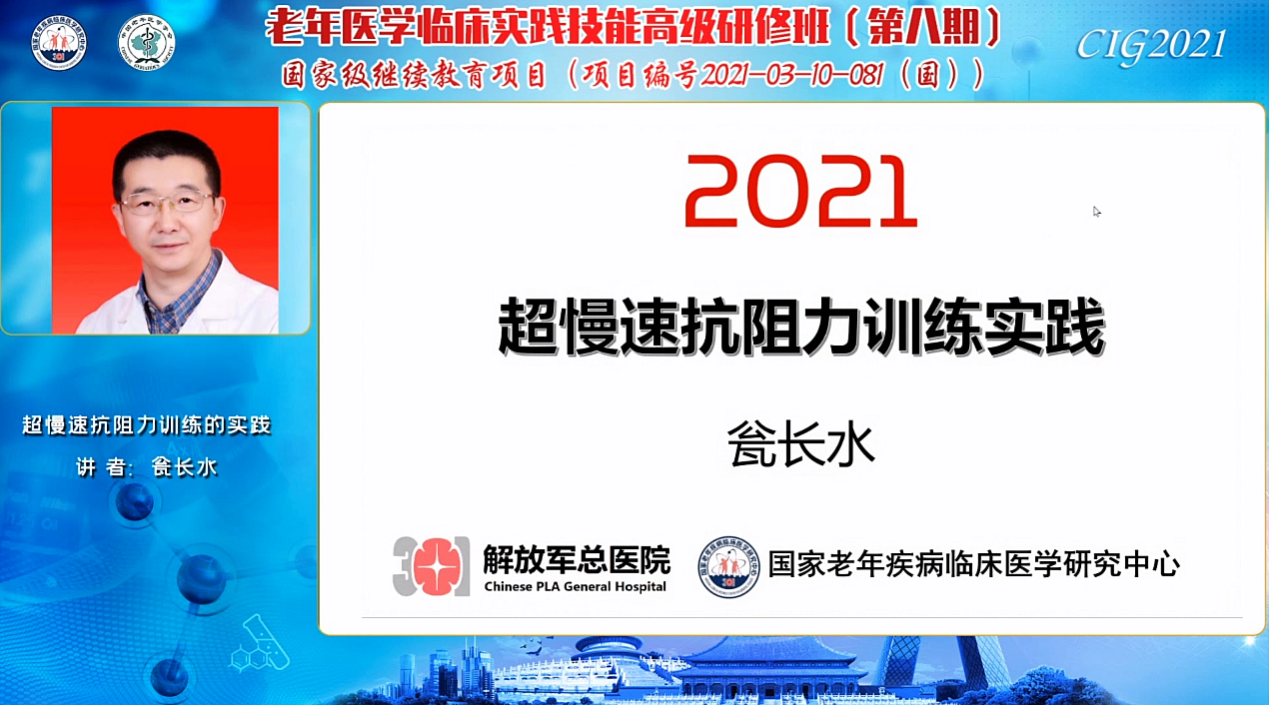
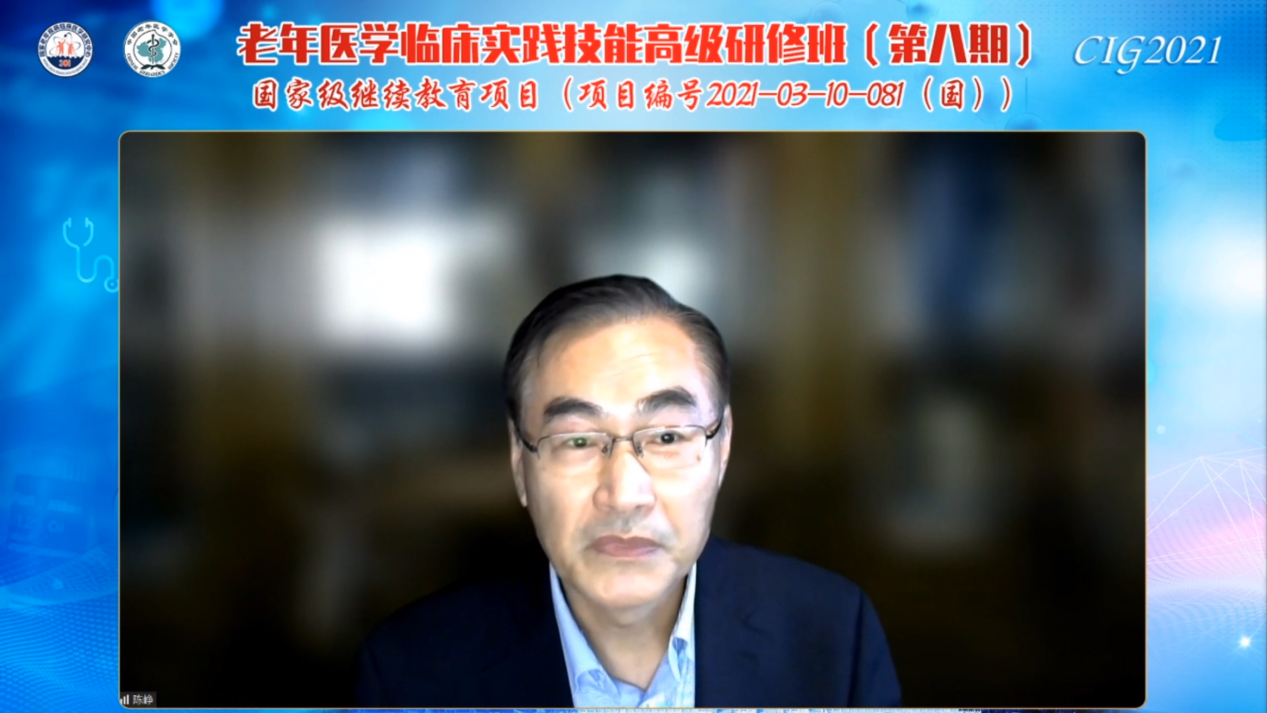 Finally, Chen Zheng, Vice president of Chinese Geriatrics Society, made a summary of this workshop. First of all, he expressed his gratitude to the experts of this workshop for their wonderful speeches and to all the colleagues and relevant units who have strongly supported this workshop. Although the workshop was affected by the epidemic and the teaching method was changed from offline to online, it was also a useful attempt and accumulated experience for expanding the development forms of the workshop in the future.
Finally, Chen Zheng, Vice president of Chinese Geriatrics Society, made a summary of this workshop. First of all, he expressed his gratitude to the experts of this workshop for their wonderful speeches and to all the colleagues and relevant units who have strongly supported this workshop. Although the workshop was affected by the epidemic and the teaching method was changed from offline to online, it was also a useful attempt and accumulated experience for expanding the development forms of the workshop in the future.
The conference focused on the international vision of geriatric medicine development, the improvement of interdisciplinary team work skills for the elderly, the interdisciplinary team management of senile fthenia/sarcopenia and cognitive disease, the management skills of senile comorbidity from the perspective of geriatric medicine and the improvement of clinical research skills. At the same time, a seminar on "the construction of multi-disciplinary outpatient and nutrition demonstration ward for senile patients" was carried out. 67 experts gave lectures and guidance, and nearly 30,000 people paid attention to participate in learning. A complete success. The continuous development of training courses has played an important role in promoting the training of geriatric medical talents and delaying the debilitation and disability of the elderly.
Vice President Chen Zheng said that there is still a long way to go and more problems to be solved in the development of geriatric medicine in China. He hopes that all his colleagues will shoulder the mission and forge ahead to make geriatrics a better tomorrow! Let every elderly person have a healthy old age!
Prev
In 2025, the first "dual-teacher Class" for medical and elderly care integration and palliative care was launched - systematically cultivating talents in elderly health services to empower the high-quality development of the elderly health cause
Next
Clinical Skills Improvement Class for Geriatricians (Phase I) and Training Course on Comprehensive Assessment Technology and Application for the Elderly Held in Beijing

